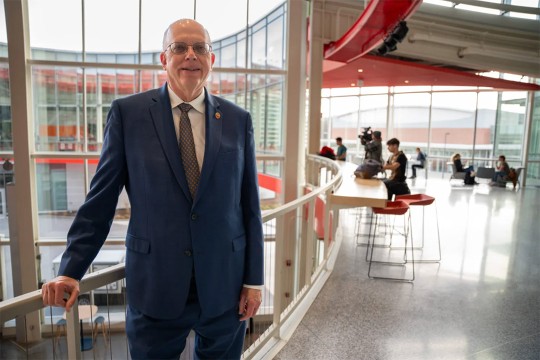Chinese University Hosts PEN-International Seminars
During a recent workshop at Tianjin University of Technology (TUT) in China, four faculty members from TUT, where PEN-International established a high technology multimedia lab last year, shared their expertise with more than 25 faculty members and administrators representing upper secondary and postsecondary settings from 18 regions of China.
"This visit was particularly meaningful as the faculty members from TUT have now become ‘exporters’ of the technology they learned from us," said PEN-International Director James DeCaro. "One of our goals is to share educational and technological expertise with educators worldwide and then to have them move from being ‘importers’ of the knowledge to being self-sufficient teachers to being ‘exporters.’ Our TUT colleagues now have become the exporters."
PEN-International is a multilateral international effort to network colleges and universities that educate people who are deaf. PEN-International is funded in large part by a grant to NTID from The Nippon Foundation of Japan.
PEN’s agenda during the China visit also included the first-ever Sino-American videoconference regarding deafness. The session, "How to Facilitate Classroom Communication," was conducted via videoconference from the United States by NTID Associate Professor Sidney Barefoot.
"This was a superb use of the TUT PEN-International Multimedia Lab," said Professor Bao, director of the TUT college for deaf students. "We will now use the lab extensively for these videoconferences with NTID and other PEN-International institutions."
A secondary focus of the visit was the initiation of a long-term research project by PEN-International Research Consultant Patricia Mudgett-DeCaro, an adjunct faculty member at NTID. The project will focus on the history of postsecondary deaf education in China, its current status, and future projections about its place in the Chinese educational system. Researcher Mudgett-DeCaro and PEN-International Research Associate Yufang Liu interviewed 15 educational leaders during the visit to TUT.
PEN-International uses innovative educational and information technologies, as well as faculty training and development strategies to help improve the postsecondary education of people who are deaf worldwide. Over the next several years, PEN-International expects to be working in at least six different countries. Visit Pen-International’s web site at http://www.pen.ntid.rit.edu.
The first and largest technological college in the world for students who are deaf and hard of hearing, NTID, one of eight colleges of RIT, offers educational programs and access and support services to 1,100 students from around the world who study, live, and socialize with 14,000 hearing students on RIT’s campus. Web address: www.rit.edu/NTID.
For more NTID news see www.rit.edu/NTID/newsroom.














